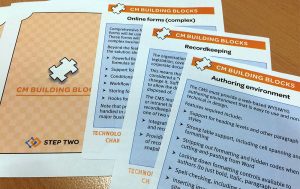Filed under: Content management
| Detailed product descriptions | |
|---|---|
| Importance to consumers? | |
| Very important | 64% |
| Important | 24% |
| Somewhat important | 10% |
| Not important | 2% |
| How do vendor websites rate? | |
| Very good | 5% |
| Good | 29% |
| Acceptable | 37% |
| Poor | 24% |
| Very poor | 5% |
Once customers have read a summary, they need a detailed description of the CMS. This should cover all important areas, give technical information where necessary, and give details of any necessary infrastructure or training. As a survey respondent observed:
“I have no desire to speak to a sales person or consultant about the features, benefits, specs, and prices of the software/solutions, until I have a good understanding of whether the offered product is relevant to my needs. However, I can’t determine this from the information provided on their websites by 90% of the vendors; it’s all marketing speak and babble.”
Detailed descriptions enable customers to assess the product’s suitability for their needs, given its overall capabilities and design. When preparing a shortlist, customers need details.
“The lack of information on some sites leads me to believe that either they are a small shop or the product may not truly do what it is supposed to.”
This category overlaps considerably with features and benefits (to be covered in a future post), and many vendors treat these as the same thing, which they are not. Even some of the best practice sites below have labelled their information as features or even benefits. Until an accepted standard list of CMS functionality becomes commonplace, this confusion is likely to continue, as vendors work out the best selling points for their products.
“The marketing fluff is a good intro for the management types, but why can’t I dig a little deeper and find the complete specs, screen shots, and the whole story? “
Site comparisons
Only four sites reviewed came close to meeting our criteria for complete detailed descriptions of the product, in plain English, without too much marketing overkill. More than twice that number did not include descriptions at all, preferring to invite customers to contact their sales reps, or rely on a tour or presentation.
Unfortunately, as the survey shows, many customers resist contacting sales staff until they feel they know enough about the CMS to be able to ask useful questions. Online tours and presentations are effective, but do not include all the information that a customer needs for a preliminary
evaluation of the product.
Of the survey respondents, 88 percent felt that detailed product description was important or very important, and many pointed out the failings of vendor websites in this area.
“Most are completely inadequate to provide any genuine detail on how the product is likely to work in the intended business application.”
“Most of the ones that I have looked at are long on marketing hype and short on the actual ‘nuts and bolts.’ They are clearly aimed at the exec. level person with no real technical background. In general, they are very vague about their real capabilities, system requirements, interface design, and all the other things we need to know.”
Two-thirds of the sites visited gave some details for selected aspects of their products, but not other major areas of CMS functionality. Alternatively, detailed information might have been too glowing, giving the impression of marketing copy, rather than sober product information. This tendency particularly annoyed some of the survey respondents, eliciting comments such as:
“They mostly fill their websites with the same sales speak that gives nothing away that implementors (such as myself) need.”
“There is no excuse in not providing more detailed information on a website, unless their own CMS don’t quite cut the cheese.”
Best practice
Customers are hungry for more detailed information about CMS products, and this is one area where vendors could showcase the information-handling properties of their products. One of the potential virtues of a website as a marketing tool is the ability to give customers access to a great deal of information if they want it, without boring those customers who do not. Few vendors are doing this, possibly because they do not want too much information about their products to be publicly accessible to competitors.




